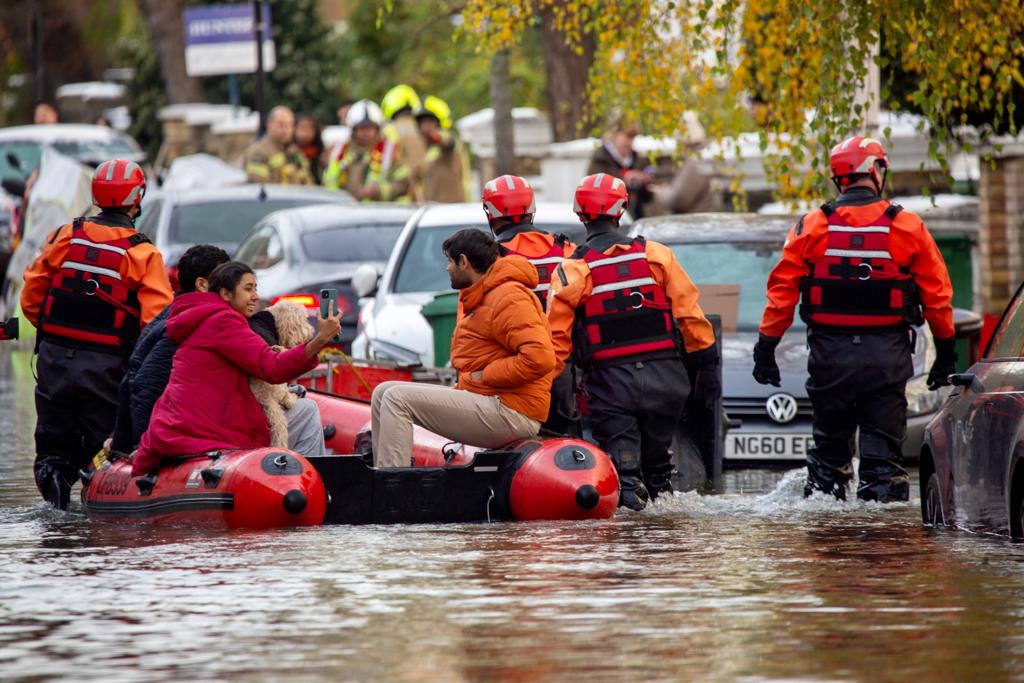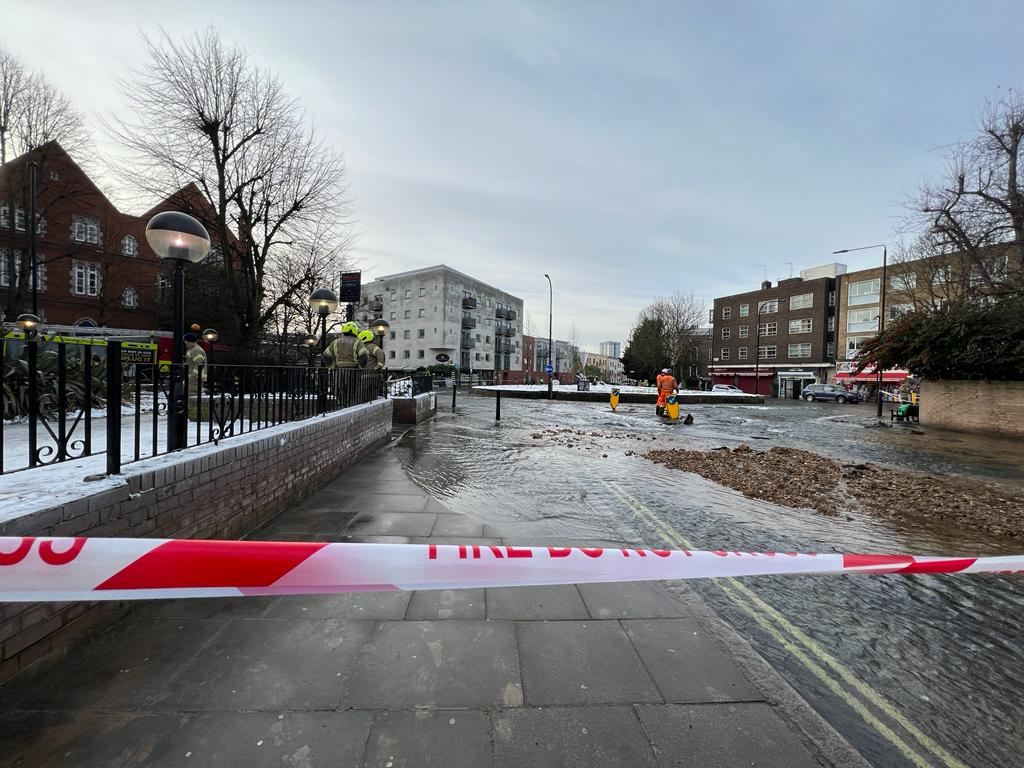Thames Water says ‘money has to be found from somewhere' to upgrade pipes after Camden flooding
Ground movement blamed for Christmas catastrophe in Belsize Road
Tuesday, 21st February 2023 — By Richard Osley

Rescue crews in the water after flooding in Belsize Road [Simon Lamrock]
SENIOR company figures from Thames Water said “”money will have to come from somewhere” to replace bursting mains as they took questions from councillors on Monday night.
They insisted that the firm was not making hundreds of millions of pounds and that press reports about the size of its profits were wrong.
Instead, with miles of ageing mains in need of upgrades, funding for the scheme would have to come from elsewhere, a scrutiny meeting was told, possibly through tax or an increase in customer bills.
The company was summoned to appear before Camden’s cross-party environment scrutiny committee to explain what went wrong around Belsize Road, South Hampstead, on December 17.
A burst mains turned roads into rivers with people, in some cases, escaping their flooded homes in boats. Rest centres were set up to deal with people unable to get into their properties or those who lost power.
Thames Water is still waiting for more investigation reports to provide a full analysis of what caused the burst but the meeting was told that a “working hypothesis” was that ground movement had been the main factor.
Martin Padley, the London Water director for Thames Water, said that before answering questions he wanted to say that he was “personally mortified, and as a company we are mortified” for what had unfolded on the day of the flood.
He said that the company had been receiving thousands of reports of burst pipes across London during the sub-zero cold snap.
“Is this indicative of climate change?,” he said. “Well, it’s certainly been an odd year, let’s just put it that way. We’ve had the hottest period on record in recent years. We measure something called ‘soil moisture deficit’, which in simple language is just the dryness of the soil. It had been the driest it had been on record.”
He added: “So we had a period in the summer where the ground moved: it expands in the winter, it’s contracts in the summer – and it’s particularly a problem in London with clay soil. I’ve been in the water industry for a very long time and there is no doubt the climate has changed a lot in that period – there’s more extremes than it used to be when I started 28 years ago.”

[Simon Lamrock]
He said that Thames Water had increased the number of repair teams on the ground, but: “If I could get more by the way I would. They just aren’t available for me to get.”
The pipe that burst in Belsize Road was nearly 100 years old, stamped 1925, but Simon Moore, head of London planning at Thames Water, said that the “forces in breaking them are substantial” and that there was not much evidence of corrosion.
He said: “The best thing we can do to make our network more resilient is to replace it. It’s also the most costly thing to do. It’s also the most intrusive thing to do for customers in terms of shutting roads, or what have you. It’s also the most time consuming thing to do. We are in the process of replacing hundreds of networks, but not as fast as we would like to do it.”
He added that there had already been a “substantial” amount of work in Camden “but it obviously hasn’t stopped this event and there is still a reasonable length of network that is not replaced, which we need to work through sort of in due course.”
The company’s representatives said that its shareholders had been putting in investment in recent years rather than collecting plump dividends, as it tried to make up £1.9 billion it needed for the mains work beyond what it had been allowed by the regulator to take in customer bills.
But this would not go on, councillors will told, amid questions over how the provision of water should be set up. There have been calls for basic utilities to be nationalised in recent years, rather than having a system that allows private business to try and make money out of something everybody needs – like running, clean water.
Mr Padley said: “It’s often quoted how much profit we make. The turnover of the business about 2 billion pound actually we made a small loss last year. It got reported in the press that we made profit, but that was because of a prior year adjustment. It was an accounting treatment. It was not a profit. In fact, we made a small loss of about 11 million pounds.”
He added: “In terms of the investment and the delivery to shareholders: they’ve actually had no dividend from the company for six years.”
Customers have no choice over whether they use Thames Water or not, but due to this monopoly a regulator sets how much it can charge in bills.
“It’s really tough call isn’t it? I mean, when I joined the industry just after privatisation, it was not in a great state, and being really truthfully honest with you, there’d been decades of underinvestment,” Mr Padley told councillors.
“I guess I’d worry as a water as a dyed-in-the-wool water industry professional, that if the ocean if it moved we’d be up against education, health, and all those sorts of equal priorities. So it’s not our call to say how we are owned and how we are regulated. It’s our call to do the best with what we have. But it’s very obvious to us climate change is real.”
Mr Moore added: “The money has to be found for somewhere. That’s the point. So whatever the ownership model is, whether it’s a general taxation or specific water bills, that money has to come from somewhere to address these asset [the mains pipes and other equipment] issues.”
Mr Padley said the company was “very sensitive” to any discussion around raising bills.